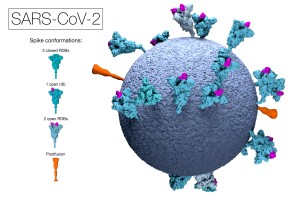
Vaccines which are in the pipeline will work against the new variants of SARS-CoV-2
New Delhi: At least 20 people who had returned from United Kingdom to India are tested positive with the new COVID-19 strain which is claimed to be up to 70 per cent more transmissible than the original strain of the disease. The figure includes six who had tested positive with the new strain on Tuesday. The samples that tested positive for the new strain were 8 from NCDC, Delhi; 7 from NIMHANS, Bengaluru; 2 from CCMB, Hyderabad; 1 from NIBG Kalyani near Kolkata; 1 from NIV, Pune and 1 from IGIB, Delhi.
In a major development, as a measure to control the transmission of this new variant in India, an Indian SARS-CoV-2 Genomics Consortium (INSACOG) has been formed with 10 Government laboratories to ascertain the current status of new variant of SARS-CoV-2 (SARS-CoV-2 VUI 202012/01) in the country. Its function is also to establish a sentinel surveillance for early detection of genomic variants with public health implication and to determine the genomic variants in the unusual events/trends.
“Comprehensive contact tracing has been initiated for co-travellers, family contacts and others. Genome sequencing on other specimens is going on…The situation is under careful watch and regular advice is being provided to the states for enhanced surveillance, containment, testing and dispatch of samples to INSACOG labs,” the ministry has stated. The government is now making efforts to track down and screen nearly 33,000 persons who had returned from the UK between November 25 and December 23, 2020.
The Principal Scientific Adviser Dr. K. Raghavan assured media persons on December 29 that vaccines in the pipeline in India and all over the world will work against the new variants of SARS-CoV-2. In this context, he explained that there is no evidence that current vaccines will fail to protect against COVID-19 variants reported from UK or South Africa.
In reply to a media query about efficacy of vaccine on the new variant, he stated, the UK variant or South Africa variant does not compromise the polyclonal antibody response, on which all current vaccines are based. They target multiple parts of the protein, most of which is not affected by these strains. Hence, there is no reason to believe that the vaccines will not be effective. He said, “The changes in the variants are not sufficient to make the vaccines ineffective.Most of the vaccines target the spike protein, in which there are changes in the variants. But vaccines stimulate our immune system to produce a wide range of protective antibodies”.
Speaking about the new variant and mutation that occurs in viruses, Director-General of Indian Council of Medical Research Prof.(Dr.) Balram Bhargava said that it is important that we do not put too much immune pressure on the virus by which it will tend to mutate more. He advised judicious use of therapies for which benefits have been established and stopping use of all those therapies for which benefits have not been proven.
In the context of efficacy of vaccines on the new strain, he said, “much of the vaccines that are the front-runners are targeting the ‘S’ protein and also the mRNA. We find that they will continue to be effective from the available data. We have to be careful about any immunity break-through that may happen during vaccination”. He further said that much of the vaccines that are the front-runners are targeting the ‘S’ protein and also the mRNA. “We find that they will continue to be effective from the available data,” he asserted.
Watch the video of the Health Officials’ press conference:
Dr. Raghavan further explained, “Changes have been observed in the ‘S’ proteins on the surface of the new variants of corona virus. The viruses undergo changes from time-to-time. Most of these changes do not affect the virus or even the spread of infection. But, sometimes changes are such that its intensity of transmission and other properties change. Such a concern has been raised at UK and South Africa presently. This new strain of SARS-Cov-2 show 17 changes in the spike protein, out of which 8 are in the part which codes for the spike protein. One such change increases affinity for ACE2 receptor, used for entry in human cells. Thus its power of transmission has increased. Another change promotes entry into susceptible cells. These changes are causing concerns. Field data has also shown the UK variant to be more transmissible. This is spreading very rapidly and taking over the frequency of all other variants. It is also reflected in the large positivity in UK. There is no evidence so far that it increases severity of the disease. But, because it increases transmission, it will affect the number of people who are affected and, therefore, the number of severely diseased people. Therefore, we must take extraordinary precautions to prevent this kind of variants from dominating a population”.
Dr Raghavan said, INSACOG consortium will do testing and sequencing of samples from not only international travellers, but also from across the country and from those being admitted to hospitals.
In a word of caution, Dr. Raghavan advised that there should not be any complacency in our behaviour, inspite of a decline in positivity and death rate. “A vaccine will be available soon and it will surely be an exit visa for the virus, but the process of rolling out the vaccine will take time. Till then follow all public health measures scrupulously”, he added.
Cautioning about the new variant, Dr. V.K. Paul, Member (Health), NITI Aayog stated, “This new variant of SARS-CoV-2 strain may have its own run. We have to be very careful. When a new virus enters, it is easy to suppress it in the beginning as the chain of transmission remains small then. Thus, we have to stick to the path of carefulness”
Speaking about the work of the newly formed INSACOG, Dr. Paul stated that there were 10 Identified Regional Genome Sequencing Laboratories (RGSL) for genome sequencing in assigned regions. “States have been tagged to these RSGLs for genome sequencing in assigned regions. SOPs for collection of samples and workflow has also been brought out by INSACOG,” he added. NCDC, New Delhi is the Nodal Unit which will maintain a database of all samples of the new variants.
Dr. Paul stated that ICMR has decided to study the symptoms and clinical co-relation of those detected with the new variant of SARS-CoV-2. “Till now, it seems that it does not cause much seriousness, but transmits faster”, he informed. But, if transmission happens at a great scale, then it will cause damage, added Dr. Paul. Hence, from the perspective of public health response, testing, tracking and tracing will continue in the same manner at a great speed. Wherever a cluster is found, a containment zone will be formed, house-to-house search and isolation of positive cases will be done, added Dr. Paul.
This apart, the number of active cases is less than 2.7 lakhs after six months and declining further, the government claimed. While cumulative positivity rate is 6.02% now, positivity rate during the last week was 2.25%.In another landmark achievement, daily new cases are less than 17,000 after 6 months now. Daily deaths are also less than 300 after 6 months, Union Health Secretary Shri Rajesh Bhushan told media persons here.
The Health Secretary further informed that analysis shows that 52% of the COVID-19 cases are in the 18-44 years age group and 63 percent of all COVID-19 patients are males. Also, 55 percent deaths are found to have occurred in the 60 years and above age group and 70 percent of the deaths have occurred to males in the country. He further stated that India still figures amongst the lowest in the world in terms of cases per million population, which is 7,408 and also active cases per million population, which is 194. He informed, 110 new cases and 2 deaths per million have been reported in the last 7 days. The Health Secretary also said that five states/Union Territories accounting for 60 percent of total active cases in the country are Maharashtra, Kerala, West Bengal, Uttar Pradesh and Chhattisgarh
In reply to another media query about prioritisation of population groups for vaccination, Dr. Paul replied, a committee has been constituted with experts coming from various specialties (like cancer, heart, kidney, lungs etc) who will decide upon the process of identifying and prioritising patients with co-morbidities for the purpose of vaccination. The committee’s report is expected soon, he added.
– global bihari bureau





